- Home
- Jennifer Ashley
Murder in Grosvenor Square Page 3
Murder in Grosvenor Square Read online
Page 3
I noticed Donata watching the young people sharply, but when I caught her gaze, she turned away with a neutral expression.
Lady Derwent seemed in good spirits. The lady was dangerously thin, consumption wasting her. Sir Gideon had taken her for a short holiday to warmer climes after New Year’s, but Lady Derwent insisted on returning to London for the Season. Studying her, I surmised it might be her last. She had the bright-eyed, animated look consumptives took on when they were nearing the end.
I was sad for them. These people were too kind, too gentle, for the sort of tragedy they were rushing headlong toward. I only hoped I could help when it struck.
My adventure in the park was not discussed. Not the thing in front of ladies, of course. Perhaps that was why the Derwents worked hard to keep this evening pleasant and harmless, so that such topics did not darken the door of their grand home.
When my wife and I returned to her Adams brothers’ decorated house in South Audley Street, Donata shed her politeness as she shed her clothes, and bathed me in cigarillo smoke and her opinions.
“Miss Anna Braithwaite as a match for Leland Derwent?” Donata said as she reclined on her chaise, clad in her favorite peignoir. She wore a turban woven through her curls and had a cup of tea and glass of brandy at her elbow. The idea that ladies should drink nothing stronger than ratafia, or perhaps sherry, was absolute nonsense to her.
I sipped from my own glass of brandy as I lounged in a Bergere chair, comfortable in my dressing gown. I’d grown fond of these sessions with my wife late at night, shut away from the world, listening while she dissected it.
“Quite a bad idea,” Donata went on. “Leland Derwent needs a woman with backbone. Heaven knows he doesn’t have one of his own. Not the lad’s fault, with his upbringing.”
“The Derwents are the kindest people in England,” I said, a bit stiffly. “I like them.”
“Everyone does,” Donata answered, unworried. “That does not mean they are the wisest people on earth, or that they would not do well with a little bolstering of their blood. If Leland is paired with an insipid female, the two of them will be crushed underfoot, especially with Lady Derwent dying. Sir Gideon will collapse without his wife, and someone will have to hold up that family.”
I hated to think of the day when Lady Derwent left them, but I knew Donata spoke the truth. “They have Mrs. Danbury,” I suggested.
Mrs. Danbury was Sir Gideon’s niece, a woman twice widowed, with much more experience of life than the sheltered Derwents. She had not been present tonight—the explanation offered was that she dined with dear friends.
“Ah, Mrs. Danbury.” Donata took a long pull of her cigarillo and let smoke trickle out with her words. “I forgot, you have a tendre for her.”
I blinked. “I beg your pardon. I have never had a tendre for Catherine Danbury.”
Donata’s eyes glinted. “And yet I recall one afternoon how you, far gone on the fumes of an interesting gas, threw away your walking stick and danced and danced with Mrs. Danbury. Laughing. You would have kissed her, had you not remembered yourself in time.”
She was not wrong. My face grew hot as I recalled the day. I’d made a complete and utter fool of myself, having breathed in an intoxicating gas offered at an afternoon society gathering. The gas had, amazingly, taken all pain and soreness from me, and had apparently taken away my reason as well. My only excuse for partaking of the gas was that I’d been investigating a murder with connections to the gathering’s host. Donata had been present, observed me closely, and had been quite critical. She’d also been very helpful, after that, in my pursuit of the killer.
“Blame the concoction,” I said. “I would have danced with you instead, but you were rather off-putting that day.”
“I didn’t know you.” Donata waved away smoke and took a sip of brandy. “Even if I had been friends with you then, I certainly wouldn’t have let you waltz me about a drawing room full of rather tawdry people.”
I raised my brows. “Your friends and acquaintance, I’d thought.”
“Tawdry all the same.” One dark curl had escaped her cap and rested like coiled silk on her shoulder—I grew distracted watching the candlelight play upon it. “I enjoyed the gas—a new sensation and good for the humors. A pity Inglethorpe had to get himself skewered.”
We both fell silent as we remembered the dire circumstances of that case. During that investigation, as well, had been the first time I’d kissed Donata.
“I have been pondering the matter of Leland Derwent,” I said after a time. I took a deep drink of brandy, savoring its rich, burning taste. “I am thinking of him as a match for Gabriella.”
Donata froze in the act of lifting her tea, the cup hovering in the region of her bosom. “You are joking.”
“Not at all.” I rolled my glass between my palms. “You are right that Leland is unworldly and naive. Gabriella has also been sheltered, thank God, but she has a great deal of common sense. Leland is a fine young man, his parents are of impeccable stock and reputation, and Sir Gideon is wealthy. Gabriella would be well provided for.”
Donata only pinned me with an amazed stare. Steam rose from the tea, curling around her face like smoke. Then she abruptly set down the cup.
“Well, I never thought of you as a man of ambition, Gabriel.”
I gave her a perplexed look. “Ambition?”
“Indeed. I’d thought you fond of the Derwents, the only explanation for you craving their company.”
It took me a moment to understand her implication. “You think I have simply been cultivating them for my daughter?” I asked, offended. “You believe me to be that sort of man?”
“Either that or you have run completely mad. Gabriella and Leland Derwent?” Donata shook her head. “There are only two explanations for the idea, Gabriel—either you are ambitious or you are mad.”
“I am thinking of Gabriella’s future,” I said, spreading the fingers of one hand. “I have nothing to leave her—no money, and only a rundown house in Norfolk that will go to the next Lacey heir, whoever he might be. Sir Gideon’s fortune could ensure Gabriella’s care for the rest of her days. The family is generous and, as we have agreed, kind. I can’t think of a better place for Gabriella than in the bosom of the Derwents.”
“A fine idea if you want her to be great friends with them,” Donata argued. “But she cannot marry Leland, Gabriel. She would die of the tedium. She might we well provided for, but she’d be miserable.”
“Miserable? Isn’t that taking it a bit far?”
“I remain firm to the adjective,” Donata replied. “Gabriella has a lively mind. She questions, she speaks, she does not meekly wait to be told what to do as does Melissa Derwent. The Derwents read and converse, yes, but only on very safe topics. The music of the Bach family, Sheridan’s dreary comedies, the lovely landscape paintings of the East Anglians. Nothing controversial or challenging. Gabriella will become as stiff-necked as Hannah Moore and her manuals of morality. I would rather your daughter remain old-fashioned and forthright. It’s refreshing in a world of growing insipidity.”
We studied each other, Donata resolute, I, troubled. I understood Donata’s objections, and in fact, shared them myself. But I was a father, one catching up on many years of watching and worrying. I needed to make certain that Gabriella, poised on the threshold of womanhood, would be safe.
Donata had plenty of money, it was true, but her six-year-old son was now Viscount Breckenridge, holder of the vast Breckenridge properties and wealth. Donata was well provided for through trusts from her parents, but her fate, mine, and my daughter’s if she remained with us, would be entirely in the hands of Peter when he came of age. He might grow up to be as boorish as his father, refusing to help the daughter of his stepfather.
Peter had no obligation to me—I was only the army captain who’d married his mother. In fact, if he chose, he could turf Donata and me out of this house and any other he owned. Peter was a pleasant lad and fond of his mother,
so the event seemed unlikely, but he’d not yet been launched into the terror that was English schools. I’d survived them by being quick with my fists and a bit of a bully. Peter would either have to do the same, or be crushed, as boys like Leland had been.
The best thing a girl child could do was marry well. Donata was determined to bring Gabriella out and make a good match for her with the son of a respectable English family.
Her good intentions stirred my greatest fears, however. What if Gabriella was paired with a sprig of the gentry who beat her, broke her spirit, demanded she wait on him hand and foot, and left her destitute in the end? Donata was wise enough to weed out the worst of the prospects, but one never knew. Unfortunately most women realized their mistake in a marriage after the wedding.
“Who then?” I asked her. “What about Gareth Travers? A fine young man, with a mind more open than the Derwents, and his father a clergyman.”
The snort from my wife indicated her opinion. “Travers? Now you have run mad. He hasn’t got two coins to rub together.”
“Who is being ambitious at this turn?” I asked, but with good humor. “Leland is insipid but rich; Travers of a good mind but no means. What is my daughter to do?” I took another thoughtful sip of brandy and balanced the glass on the arm of the chair. “Truth to tell, I do not know Travers’s circumstances. He says his father is poor, yet he dresses almost as well as Grenville.”
“Fashion, my dear Gabriel. A young man has to turn himself out well, even if he is in hock to every tailor, hatmaker, bootmaker, and glovemaker in Bond Street. And probably up to his neck with bookmakers as well, trying to raise cash to pay off the others.” My wife, ever cynical.
“A man who lives off gambling would not be much of a catch,” I admitted.
“I would wager Leland gives him some of the money,” Donata said, lifting her goblet of brandy. “Leland is generous, too much so. Or perhaps Leland sends Gareth to his tailor, and Gareth supplements his meager funds by selling pieces of his wardrobe. Most young men of ambition and little money learn to be resourceful.”
I remembered Gareth’s tale of Leland trying to help an indigent man with money and clothing, and the ungrateful man stealing more. Leland was more generous than sensible. I wondered about Gareth—I’d had no money to speak of when I’d been young, and others, like Colonel Brandon, had helped me. But I’d never have dreamed of taking base advantage of their generosity or selling what I was given.
“But I admit I know little about Mr. Travers,” I finished my thoughts out loud. “Nothing but that the Derwents recommend him.”
“Now you are learning, my dear,” Donata said, giving me a warm smile. “Matchmaking is not an easy task. It is a careful thinning of the herd, and then making certain the young people in question believe the match all their own idea.”
“Is that what happened to you?” I asked gently.
“Not at all,” Donata answered. “My father owed Breckenridge money, and Breckenridge wanted me.” She shrugged, hiding pain I knew lingered. “A match made in hell, but here I am.”
And I was glad of her presence. The vile Breckenridge was dead, leaving Donata for me.
I sighed, surrendering. “It is enough to make one’s hair gray.”
“You have a thread or two.” Donata set aside her glass and cigarillo, rose, and came to me. Her fingers in my hair were distracting, as were the scents of tea and spice that clung to her.
“I am surprised you did not accompany Gabriella to Bath,” I said. “Surely you feared she’d get herself married to an aging squire with bad breath without your supervision.”
Donata rested her hip on the arm of my chair. “I preferred to remain in London, with you.” To know whether you lived or died, she did not say, but I read in her eyes. “I would never have let Gabriella out of my sight, of course, if she hadn’t gone with Aline. I trust Aline’s judgment completely.”
“Do you?” I thought of the tall, white-haired, loud-voiced Lady Aline. True, any aging squire with bad breath wouldn’t stand a chance against Aline and her stout walking stick.
“Of course I do.” Donata kissed the top of my head. “Aline likes you.”
I snaked my arm around my wife’s waist, overbalancing her until she landed across my lap. My glass of brandy, which had rested on the other arm of the chair, fell to the carpet in a wave of pungent alcohol, but at the moment, I couldn’t be bothered to notice. The brandy tasted better on Donata’s lips, in any case.
*
As was her habit, Donata lay abed far into the next day while I, restless, had to be out and about, riding, walking, or tending to business. I rose at daylight, sliding quietly from the bed so as not to disturb her, and made for my dressing room to wash and dress.
Bartholomew put me into yet another new suit, this one with leather breeches and a warm coat, made solely for riding.
“If her ladyship keeps on in vein,” I said to Bartholomew, “I’ll have more clothes than Grenville, and we’ll be obliged to hire another house in which to store them.”
“A gentleman should have a suit for every occasion, sir,” Bartholomew said, somewhat haughtily.
He had begun his career as Grenville’s footman, but now as my valet, Bartholomew was becoming quite the snob. He brushed my coat to an inch of its life and sent me off.
Hyde Park in the morning was fairly empty. Only the robust of Mayfair climbed out of bed and rode this early—the fashionable hour was much later in the day.
I preferred riding at this time, when the paths were clear. A good gallop woke me up better than sedate trots, and I put my horse through his paces. The gelding belonged in truth to young Peter, but the understanding was that I took him for exercise whenever I liked. Peter was currently staying with Donata’s parents in their elegant house in Oxfordshire—sent away as Gabriella had been in light of my duel—and I looked forward to riding with the boy again upon his return.
The park looked very different today from when I’d stood on the misty green and shot Stubby Stubbins. The air was clear, slightly warmer with gathering spring.
“Well met again, Captain,” a voice called out to me.
Chapter Four
I slowed my mount to a walk as Gareth Travers, riding a large bay mare, came trotting toward me, his high hat moving up and down as he rose and fell with the horse’s gait. Gareth pulled his horse to a walk, guiding it next to mine, and gave me a cheerful grin.
He wore a riding habit of skilled tailoring and gloves that hugged every finger. The hat, which he tipped, spoke of expense. I’d restrained Grenville’s tailor from making my coat too ostentatious, but Travers obviously hadn’t stopped his man from adding throat-stabbing collar points, wide lapels, and an unnaturally tight waist. He wore the ensemble well—I suppose the exuberance of youth made what would look ludicrous on me rather natty on him.
“Good morning, Mr. Travers,” I said, giving him a polite bow. “A fine day for a ride.”
“It is indeed.” Travers took a long breath and gazed up at the sky. “I always enjoy an early canter.”
I had never seen Travers out at this hour, and I’d been coming every day, but I held my tongue. He was young, and the young believed that doing a thing once made it the habit of a lifetime.
Travers was alone. No other horse followed us, not Leland, who was generally at his side. The Row, in fact, was quite deserted.
“You could not persuade Mr. Derwent out at such an hour?” I asked with good humor.
“Ah.” Travers lost his smile. “Leland and I have begun a coolness, as you no doubt noticed last evening.”
I hadn’t noticed anything of the sort; they’d seemed as cordial to each other as ever. “You do surprise me, Mr. Travers,” I said. “But I am certain it will pass. You and Leland have been friends for many years.”
Gareth sighed with all the aggrieved weight of the world. “We had words. Strong words. Perhaps unforgiveable ones.”
“Now, that would be unfortunate,” I said. “Close friend
ships do not happen as often as one thinks. Do not throw it away because of words.”
As I spoke, I thought of the times I’d been a pigheaded fool with Grenville, who’d proved himself a good friend by not dropping me altogether. Friends had to forgive each other. I thought myself wise, but Travers gazed at me as though I had no idea what I was talking about.
“I’m afraid this will be unforgivable,” he said, his tone deceptively light.
I cast about for an inkling of what had happened between them. I thought about Miss Braithwaite, a young lady I had not paid much attention to, but she’d be the right age to upset a long-standing friendship between single gentlemen. “Beware of letting friendship turn to rivalry over a lady, Mr. Travers,” I warned. “It can have dire consequences.” Well I knew.
Travers looked puzzled. “Over a lady? Oh.” He burst out laughing. “No, indeed, our quarrel is one piece of an ongoing and long-lived argument, a point on which Leland and I have disagreed for years. Recently, it has flared into impossible tediousness. And as a final thrust, Captain, we fell out over you.”
I blinked. “Over me? What on earth could I have done to cause a wedge between you and Mr. Derwent?”
“You asked me to be your second,” Travers said, and something flashed in his dark eyes I could not read. “Instead of Leland.”
I took in his words, growing more perplexed. I never would have thought to ask Leland to help me with anything so dangerous. Leland, alongside his father, spoke in a loud voice against violence. I had noticed that Leland had been uncomfortable with me last evening, which I’d put down to him being unhappy with me for dueling.

 Grant
Grant Pride Mates
Pride Mates The Duke's Perfect Wife
The Duke's Perfect Wife Scandal Above Stairs
Scandal Above Stairs White Tiger
White Tiger Midnight Wolf
Midnight Wolf Rules for a Proper Governess
Rules for a Proper Governess Wild Wolf
Wild Wolf Bad Wolf
Bad Wolf Lion Eyes
Lion Eyes Murder in Grosvenor Square
Murder in Grosvenor Square The Untamed MacKenzie
The Untamed MacKenzie Wicked Deeds of Daniel Mackenzie
Wicked Deeds of Daniel Mackenzie Tiger Striped_Shifters Unbound
Tiger Striped_Shifters Unbound Murder Most Historical
Murder Most Historical Shifter Made
Shifter Made Mate Bond
Mate Bond Tiger Striped
Tiger Striped Bodyguard
Bodyguard Guardian's Mate
Guardian's Mate From Jennifer Ashley, With Love
From Jennifer Ashley, With Love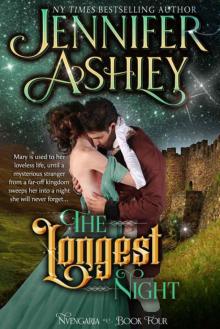 The Longest Night
The Longest Night The Stolen Mackenzie Bride
The Stolen Mackenzie Bride The Sudbury School Murders
The Sudbury School Murders The Care & Feeding of Pirates
The Care & Feeding of Pirates The Hanover Square Affair
The Hanover Square Affair Death Below Stairs
Death Below Stairs Wild Things
Wild Things Wild Cat
Wild Cat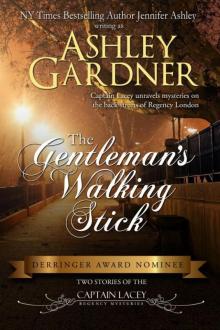 The Gentleman's Walking Stick
The Gentleman's Walking Stick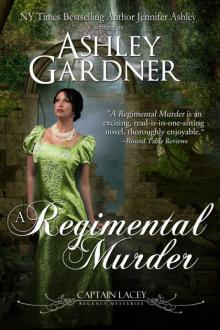 A Regimental Murder
A Regimental Murder Lone Wolf
Lone Wolf Forbidden Taste
Forbidden Taste Red Wolf
Red Wolf The Madness of Lord Ian Mackenzie
The Madness of Lord Ian Mackenzie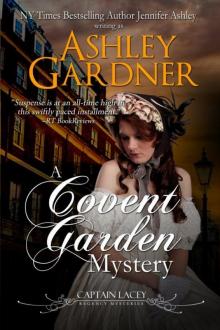 A Covent Garden Mystery
A Covent Garden Mystery The Pirate Next Door
The Pirate Next Door Past Crimes: A Compendium of Historical Mysteries
Past Crimes: A Compendium of Historical Mysteries Highlander Ever After
Highlander Ever After The Alexandria Affair
The Alexandria Affair A Shifter Christmas Carol
A Shifter Christmas Carol The Devilish Lord Will
The Devilish Lord Will Adam
Adam Kyle (Riding Hard Book 6)
Kyle (Riding Hard Book 6) A Body in Berkeley Square
A Body in Berkeley Square The Mad, Bad Duke
The Mad, Bad Duke Mate Claimed
Mate Claimed A Mackenzie Clan Christmas
A Mackenzie Clan Christmas The Seduction of Elliot McBride
The Seduction of Elliot McBride The Glass House
The Glass House Iron Master (Shifters Unbound Book 12)
Iron Master (Shifters Unbound Book 12) A Mackenzie Family Christmas: The Perfect Gift
A Mackenzie Family Christmas: The Perfect Gift Scandal Above Stairs_A Below Stairs Mystery
Scandal Above Stairs_A Below Stairs Mystery Perfect Mate
Perfect Mate Murder in the East End
Murder in the East End Snowbound in Starlight Bend
Snowbound in Starlight Bend Hard Mated
Hard Mated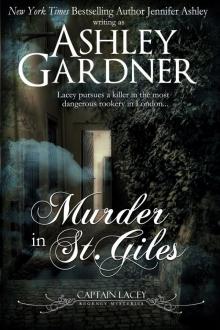 Murder in St. Giles
Murder in St. Giles Alec Mackenzie's Art of Seduction
Alec Mackenzie's Art of Seduction A MacKenzie Clan Gathering
A MacKenzie Clan Gathering Tyler
Tyler Lady Isabella's Scandalous Marriage
Lady Isabella's Scandalous Marriage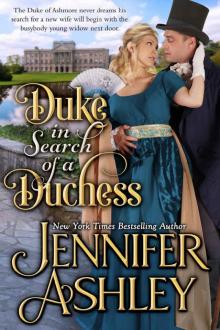 Duke in Search of a Duchess: Sweet Regency Romance
Duke in Search of a Duchess: Sweet Regency Romance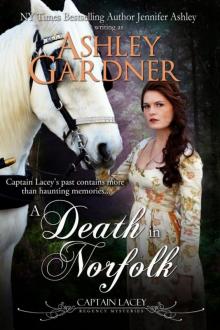 A Death in Norfolk
A Death in Norfolk Give Me One Night (McLaughlin Brothers Book 4)
Give Me One Night (McLaughlin Brothers Book 4) Iron Master
Iron Master The Many Sins of Lord Cameron
The Many Sins of Lord Cameron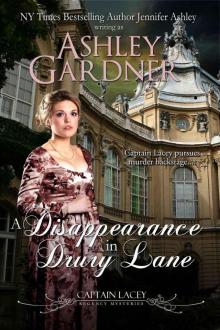 A Disappearance in Drury Lane
A Disappearance in Drury Lane Never Say Never (McLaughlin Brothers Book 3)
Never Say Never (McLaughlin Brothers Book 3) Death in Kew Gardens
Death in Kew Gardens Ross: Riding Hard, Book 5
Ross: Riding Hard, Book 5 Ray: Riding Hard
Ray: Riding Hard A Soupçon of Poison
A Soupçon of Poison Tiger Magic
Tiger Magic The Pirate Hunter's Lady
The Pirate Hunter's Lady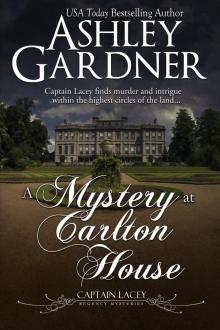 A Mystery at Carlton House
A Mystery at Carlton House The Necklace Affair
The Necklace Affair Wolf Hunt
Wolf Hunt Scandal and the Duchess
Scandal and the Duchess Kyle
Kyle Why Don't You Stay? ... Forever (McLaughlin Brothers Book 2)
Why Don't You Stay? ... Forever (McLaughlin Brothers Book 2) Bear Attraction
Bear Attraction The Gathering
The Gathering A Mackenzie Yuletide
A Mackenzie Yuletide Wild Things (Shifters Unbound #7.75)
Wild Things (Shifters Unbound #7.75) The Redeeming
The Redeeming The Seduction of Elliot McBride hp-5
The Seduction of Elliot McBride hp-5 Death at the Crystal Palace
Death at the Crystal Palace Mackenzie Family Christmas: The Perfect Gift (highland pleasures)
Mackenzie Family Christmas: The Perfect Gift (highland pleasures) Forbidden Taste: A Vampire Romance (Immortals)
Forbidden Taste: A Vampire Romance (Immortals) Care and Feeding of Pirates
Care and Feeding of Pirates Shifter Made (shifters unbound)
Shifter Made (shifters unbound) Dark and Dangerous: Six-in-One Hot Paranormal Romances
Dark and Dangerous: Six-in-One Hot Paranormal Romances The Duke’s Perfect Wife hp-4
The Duke’s Perfect Wife hp-4 The Seduction of Elliot McBride (Mackenzies Series)
The Seduction of Elliot McBride (Mackenzies Series) Lady Isabella's Scandalous Marriage hp-2
Lady Isabella's Scandalous Marriage hp-2 BodyGuard (Butterscotch Martini Shots Book 2)
BodyGuard (Butterscotch Martini Shots Book 2) The Wicked Deeds of Daniel Mackenzie hp-6
The Wicked Deeds of Daniel Mackenzie hp-6 Tiger Magic su-5
Tiger Magic su-5 The Madness Of Lord Ian Mackenzie hp-1
The Madness Of Lord Ian Mackenzie hp-1 Alec Mackenzie's Art of Seduction: Mackenzies (Mackenzies Series Book 9)
Alec Mackenzie's Art of Seduction: Mackenzies (Mackenzies Series Book 9) Mackenzie Family Christmas: The Perfect Gift
Mackenzie Family Christmas: The Perfect Gift Bodyguard (Shifters Unbound #2.5)
Bodyguard (Shifters Unbound #2.5) Midnight Wolf (A Shifters Unbound Novel)
Midnight Wolf (A Shifters Unbound Novel) White Tiger (A Shifter's Unbound Novel)
White Tiger (A Shifter's Unbound Novel) Cowboys Last All Night
Cowboys Last All Night Pride Mates su-1
Pride Mates su-1 Hard Mated (shifters unbound )
Hard Mated (shifters unbound ) Bodyguard (shifters unbound )
Bodyguard (shifters unbound ) Snowbound in Starlight Bend: A Riding Hard Novella
Snowbound in Starlight Bend: A Riding Hard Novella The Untamed Mackenzie (highland pleasures)
The Untamed Mackenzie (highland pleasures) The Untamed Mackenzie (Mackenzies Series)
The Untamed Mackenzie (Mackenzies Series)![Highland Pleasures [6] The Wicked Deeds of Daniel Mackenzie Read online](http://i1.bookreadfree.com/i2/04/07/highland_pleasures_6_the_wicked_deeds_of_daniel_mackenzie_preview.jpg) Highland Pleasures [6] The Wicked Deeds of Daniel Mackenzie
Highland Pleasures [6] The Wicked Deeds of Daniel Mackenzie Lone Wolf (shifters unbound)
Lone Wolf (shifters unbound)![Shifters Unbound [5] Tiger Magic Read online](http://i1.bookreadfree.com/i2/04/11/shifters_unbound_5_tiger_magic_preview.jpg) Shifters Unbound [5] Tiger Magic
Shifters Unbound [5] Tiger Magic Tyler (Riding Hard Book 4)
Tyler (Riding Hard Book 4) Ross
Ross Bad Boys of the Night: Eight Sizzling Paranormal Romances: Paranormal Romance Boxed Set
Bad Boys of the Night: Eight Sizzling Paranormal Romances: Paranormal Romance Boxed Set From Jennifer Ashley, With Love: Three Paranormal Romances from Bestselling Series
From Jennifer Ashley, With Love: Three Paranormal Romances from Bestselling Series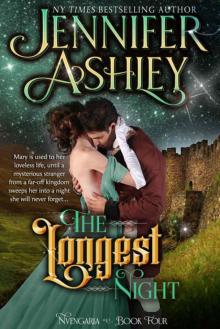 The Longest Night: Fantasy Romance (Nvengaria Book 4)
The Longest Night: Fantasy Romance (Nvengaria Book 4) The Many Sins of Lord Cameron hp-3
The Many Sins of Lord Cameron hp-3 Mate Claimed su-4
Mate Claimed su-4